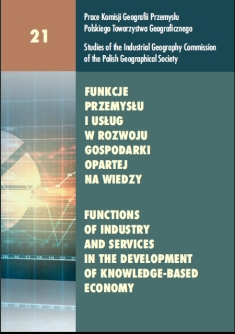The Use of EU Structural Funds in Companies of Małopolska region as a Factor in the Development of an Economy Based on Knowledge and Innovation
DOI:
https://doi.org/10.24917/20801653.21.15Keywords:
knowledge-based economy, cohesion policy, EU structural funds, SIMIKAbstract
This article aims to analyze the use of EU structural funds by the enterprises from Małopolskaregion in the context of building an economy based on knowledge and innovation. Enterprises are oneof the main actors to build an economy based on knowledge and innovation. These are also the mainbeneficiaries of EU funds. This raises the question of how these funds are used, whether and to what extent they contribute to building an economy based on knowledge and innovation, and to what extentthey aimed at satisfying only the current needs. Cohesion policy funds are allocated regionally. Inorder to analyze the use of these funds by the company from Małopolska region, research has beenmade, primarily based on the database of the National Information System projects SIMIK 07-13 (asof 30.09.2012).Without modernization of industry it is not possible to achieve cohesion with the regions of theEuropean Union. Considerable resources are therefore directed to this purpose in the framework ofEU cohesion policy. Poland is currently the biggest beneficiary of that policy, with a strong priority inthe allocation of European funds for the development of a competitive knowledge-based economy andentrepreneurship.The vast majority of projects implemented by companies in Małopolska region with the support of EUfunding are innovative projects. Quantitatively, however, projects of smaller potential dominate in thisarea, such as projects to increase exports. What raises concerns is the fact that only a small numberof projects are to support the implementation of R&D results, the development of R&D activities inenterprises and cooperation between researchers and entrepreneurs.Downloads
Metrics
References
Arrow, K. (1994). The production and distribution of knowledge. W: G. Silverberg, L. Soete (red.), The economics of growth and technical change. Technologies, nations, agents. Aldershot: Edward Elgar Publishing Company.Aldershot
Babiak, J. (red.) (2008). Fundusze Europejskie a innowacyjność polskiej gospodarki. Warszawa: Wydawnictwo Studio Emka.
Gierańczyk, W. (2010). Rola własności intelektualnej w budowaniu innowacyjności krajów Unii Europejskiej. Prace Komisji Geografii Przemysłu Polskiego Towarzystwa Geograficznego, 16, 76–86.
Główny Urząd Statystyczny (2011). Działalność innowacyjna przedsiębiorstw w latach 2008–2010. Warszawa.
Główny Urząd Statystyczny (2012). Regiony Polski. Warszawa.
Hollanders, H., Tarantola, S., Loschky, A. (2009). Regional Innovation Scoreboard (RIS) 2009. Inno Metrics.
Howells, J. (2000). Knowledge, innovation and location. W: J.R. Bryson, P.W. Daniels, N. Henry, J. Pollard (red.), Knowledge, space, economy. London–New York: Routledge, Taylor & Francis Group.
Hryniewicz, J.T. (2010). Gospodarka oparta na wiedzy a globalne procesy geopolityczne. Prace Komisji Geografii Przemysłu Polskiego Towarzystwa Geograficznego, 15, 61–68.
Klamut, M. (red.) (2011). Konkurencyjność i spójność w polityce rozwoju Unii Europejskiej. Wrocław: Wydawnictwo Uniwersytetu Ekonomicznego we Wrocławiu.
Komisja Europejska (2010). Europa 2020. Strategia na rzecz inteligentnego i zrównoważonego rozwoju sprzyjającego włączeniu społecznemu. Komunikat Komisji, Bruksela, 03.03.2010, http:// ec.europa.eu/eu2020.
Lever, W.F. (2002). The knowledge base, innovation and urban economic growth. W: Z.J. Acs, H.L.F. De Groot, P. Nijkamp (red.), The emergence of the knowledge economy. A regional perspective. Berlin: Springer-Verlag.
Link, A.N., Siegel, D.S. (2003). Technological change and economic performance, Studies in global competition series. London–New York: Routledge Taylor and Francis Group.
Lundvall, B.A. (red.) (1992). National Systems of Innovations – towards a theory of innovation and interactive learning. London: Pinter.
Markowski, T. (2000). Regionalne systemy innowacji w aspekcie strategii rozwoju regionalnego Polski 2000–2006. W: J. Szlachta (red.), Narodowa Strategia Rozwoju. Biuletyn KPZK PAN, 191, Warszawa.
Matusiak, K.B., Guliński, J. (red.) (2010). System transferu technologii i komercjalizacji wiedzy w Polsce – siły motoryczne i bariery. Warszawa: Polska Agencja Rozwoju Przedsiębiorczości.
Ministerstwo Gospodarki (2006). Kierunki zwiększania innowacyjności gospodarki na lata 2007–2013. Warszawa.
Ministerstwo Rozwoju Regionalnego (2006). Strategia Rozwoju Kraju 2007–2015. Warszawa, listopad 2006 r.
Ministerstwo Rozwoju Regionalnego (2007). Narodowe Strategiczne Ramy Odniesienia 2007–2013 wspierające wzrost gospodarczy i zatrudnienie. Narodowa Strategia Spójności. Dokument zaakceptowany decyzją Komisji Europejskiej zatwierdzający pewne elementy Narodowych Strategicznych Ram Odniesienia. Warszawa, maj 2007 r.
Ministerstwo Rozwoju Regionalnego (2010). Wpływ funduszy europejskich na gospodarkę polskich regionów i konwergencję z krajami UE. Raport 2010. Warszawa.
Molle, W. (2009). European Policies for Innovation and Cohesion; from loose coordination to partial integration. W: Cohesion Policy facing the challenges of the 21st century. Warszawa: Ministerstwo Rozwoju Regionalnego.
Molle, W. (2011). European economic governance. The quest for consistency and effectiveness. Routledge Studies in the European Economy. London–New York: Routledge.
Murzyn, D. (2012). Udział małopolskich przedsiębiorstw w polityce regionalnej Unii Europejskiej. Zarządzanie i Finanse. Journal of Management and Finance, Vol. 10, No. 1, Part 2. Wydział Zarządzania Uniwersytetu Gdańskiego.
Nelson, R. (red.) (1993). National Systems of Innovation: a comparative study. New York–Oxford: Oxford University Press.
Polska Agencja Rozwoju Przedsiębiorczości (2010). Innowacyjność 2010, Raport przygotowany pod kierunkiem A. Wilmańskiej. Warszawa.
Polska Agencja Rozwoju Przedsiębiorczości (2011). Raport o stanie sektora małych i średnich przedsiębiorstw w Polsce. Warszawa.
Verspagen, B. (1994). Technology and growth: complex dynamics of convergence and divergence. W: G. Silverberg, L. Soete, The economics of growth and technical change. Technologies, nations, agents. Aldershot: Edward Elgar Publishing Company.
Wintjes, R., Hollanders, H. (2010). The regional impact of technological change in 2020, UNU-MERIT.
Downloads
Published
How to Cite
Issue
Section
License
Articles are published under the terms of the Creative Commons License (CC BY-ND 4.0; Attribution– NoDerivs).

